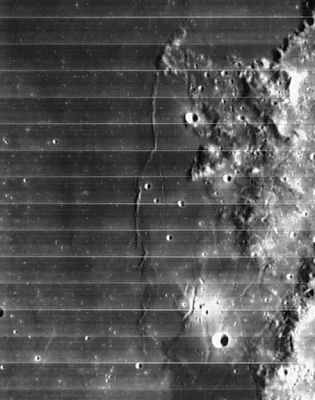Dorsa Aldrovandi
Contents
[hide]Dorsa Aldrovandi (and Fossae Pavlova east of it)
|
Lat: 24.0°N, Long: 28.5°E, Length: 136 km, Height: km, Rükl: 24 |
Images
LPOD Photo Gallery Lunar Orbiter Images Apollo Images
- Apollo 15's orbital Hasselblad photograph AS15-87-11714 shows the central part of Dorsa Aldrovandi', looking south. One of LM Falcons sixteen small exhaust nozzles is visible in the upper left corner.
- Most of Dorsa Aldrovandi is captured on Apollo 15's orbital panoramic ITEK-camera frame AS15-P-9303, running almost over the whole of the frame.
- See also the rightmost parts of Apollo 17's AS17-P-2313 and 2318.
- And also AS17-P-2758 / 2763.
- Another one of Apollo 15's orbital Hasselblad photographs of Dorsa Aldrovandi: AS15-91-12398.
- Apollo 17's color Hasselblad photographs of Dorsa Aldrovandi: AS17-153-23501, 23502, 23503, 23504.
Additional research orbital Apollo 15 and Apollo 17 photographs: Danny Caes
Maps
(LAC zone 42C2) LAC map Geologic map LM map LTO map
Description
Description: Wikipedia
Additional Information
- Unnamed ghost crater (or something which looks like the presence of an ancient crater-like structure) in the most southern part of Dorsa Aldrovandi (between the southern part of Dorsa Aldrovandi and Catena Littrow).
Nomenclature
- Ulisse Aldrovandi (11 September 1522 - 10 November 1605) was an Italian naturalist, the moving force behind Bologna's botanical garden, one of the first in Europe. Carolus Linnaeus and the comte de Buffon reckoned him the father of natural history studies.
- Immediately east of Dorsa Aldrovandi one could detect the system of rilles which was once known as Fossae Pavlova. See Lunar Topographic Orthophotomaps 42-C2 and 42-B3.
LPOD Articles
Bibliography
APOLLO OVER THE MOON; A VIEW FROM ORBIT, Chapter 4: The Maria (Part 2), Figures 75, 76, 77, 78, and 79.
